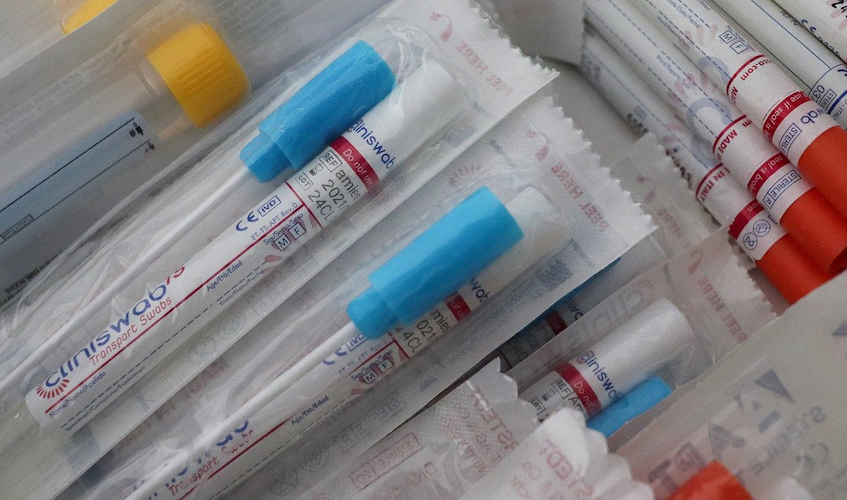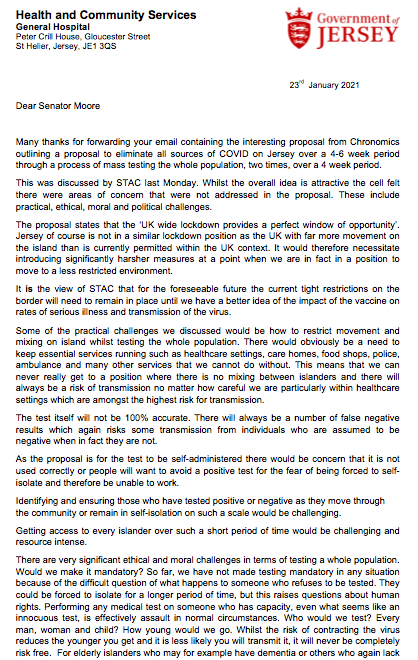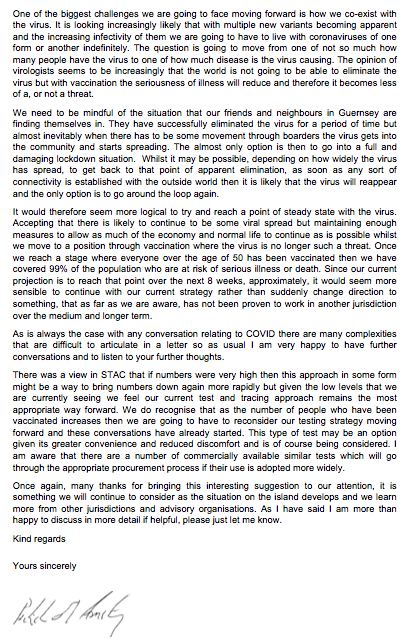


The group of scientific advisers leading Jersey’s response to the pandemic have rejected a detailed proposal to achieve covid elimination via a mass testing regime.
Jersey’s Scientific and Technical Advisory Cell (STAC) called it “attractive”, but said the idea put forward by the company Chronomics also contained “practical, ethical, moral and political challenges."
It suggested that all islanders isolate and then take a self-administered PCR test, which would be sent to laboratories in the UK.
Those who receive a negative result would have been given a 'passport' to move freely within the community while those who are positive would be asked to isolate.
Chronomics says it has capacity to process 25,000 samples a day and, as such, the whole island could have been tested over a single week.
The concept was brought to the attention of STAC Chair Patrick Armstrong and the Deputy Medical Officer for Health, Dr Ivan Muscat, by Senators Kristina Moore and Steve Pallett, and Deputy Steve Luce.

Pictured: Senator Kristina Moore was among the politicians to have presented the proposal to Dr Muscat and Dr Armstrong.
They argued that the “compelling” proposal would “come at a cost”, but said the “value of freedom it would bring” and “economic value” would be worth it.
As Express revealed, it was officially considered by Ministers and STAC early last week week.
Responding to questions from Express about the idea during a press conference, the Chief Minister declined to write it off, saying he would await professional advice.
But STAC have rejected the proposal.
Patrick Armstrong responded to Senator Moore this weekend (full letter below), telling her that, to make the mass testing elimination strategy would work, the idea would have to introduce “significantly harsher measures at a point when we are in fact in a position to move to a less restricted environment.”
Among the “practical” issues he listed were “how to restrict movement and mixing on island whilst testing the whole population”, while he also noted that the tests could also throw up a number of “false negative results."
As the tests would be self-administered, he said “there would be concern that it is not used correctly or people will want to avoid a positive test for the fear of being forced to self-isolate and therefore be unable to work.”

Pictured: STAC's Chair Patrick Armstrong said people might not administer their tests properly.
Furthermore, he raised questions about the ethical implications of mass testing.
“Would we make it mandatory? So far, we have not made testing mandatory in any situation because of the difficult question of what happens to someone who refuses to be tested. They could be forced to isolate for a longer period of time, but this raises questions about human rights. Performing any medical test on someone who has capacity, even what seems like an innocuous test, is effectively assault in normal circumstances. Who would we test? Every man, woman and child? How young would we go. Whilst the risk of contracting the virus reduces the younger you get and it is less likely you will transmit it, it will never be completely risk free. For elderly islanders who may for example have dementia or others who again lack capacity, to force them to have a test raises significant moral and ethical questions.”
He went on to note that Jersey should be “mindful” of the situation that Guernsey is in. The island has been pursuing an elimination strategy but this weekend had to lock down after finding a number of covid cases of unknown origin.
“They have successfully eliminated the virus for a period of time but almost inevitably when there has to be some movement through borders the virus gets into the community and starts spreading. The almost only option is then to go into a full and damaging lockdown situation. Whilst it may be possible, depending on how widely the virus has spread, to get back to that point of apparent elimination, as soon as any sort of connectivity is established with the outside world then it is likely that the virus will reappear and the only option is to go around the loop again.”

Pictured: Mr Armstrong made reference to Guernsey's lockdown situation in his letter.
Mr Armstrong therefore argued that it was “more logical to try and reach a point of steady state with the virus”, and that enough measures should be maintained so that as much of normal life can continue as possible while the vaccination programme continues.
He concluded, however, by suggesting that the idea hadn’t been binned altogether, but shelved for now instead.
“There was a view in STAC that if numbers were very high then this approach in some form might be a way to bring numbers down again more rapidly but given the low levels that we are currently seeing we feel our current test and tracing approach remains the most appropriate way forward.”
The Chief Minister forwarded the letter to all States Members this morning.


Comments
Comments on this story express the views of the commentator only, not Bailiwick Publishing. We are unable to guarantee the accuracy of any of those comments.